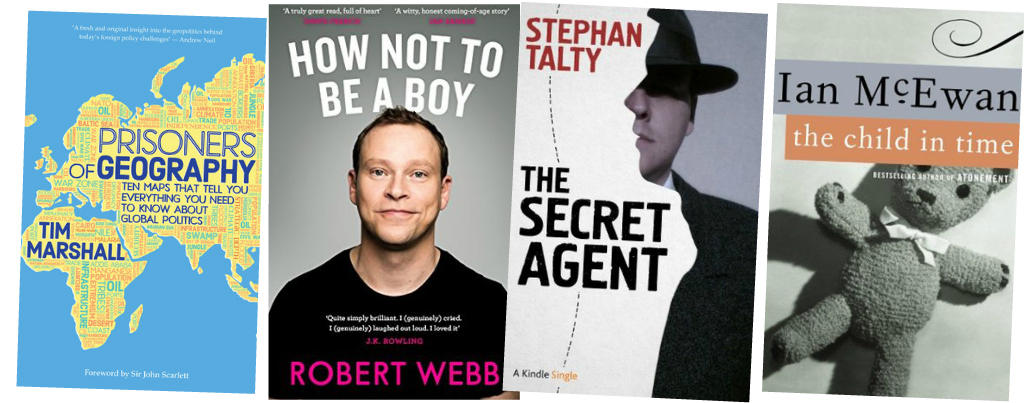What I’ve been reading this month

Geography – let alone geopolitics – isn’t one of my strong points. I didn’t even take GCSE geography. Yet Tim Marshall’s Prisoners of Geography had me completely enthralled. Marshall explained how geography influenced the development of nations and the political relationships between countries. His explanations were based on ten maps – maps which were enlightening in themselves to me. This sounds like it should have been dry and dull, but it was a real page-turner, full of insights and new angles on topics which had me fully engaged throughout. I will look at the world differently and with a much improved understanding as a result of reading this book.
Buy on Amazon | View on Goodreads
Ian McEwan’s “masterpiece” – The Child in Time – reflected on the loss a child and the strange flexibility of time. Despite its reputation, this was my least favourite of the McEwan novels I’ve read to date, which shows how little I know. There were sections which were outstandingly brilliant – McEwan’s writing is always absolutely incredible. But the whole thing seemed a bit less than the sum of its parts to me – I found the flashbacks and messing about with time more frustrating than meaningful. I got the intent of reflecting the way time seems to work for all of us, but, as a casual reader, I just found it frustrating.
Buy on Amazon | View on Goodreads
How Not to be a Boy was Robert Webb’s autobiography, which had a particular focus on gender roles. Robert Webb came across as remarkably candid, and parts of this book were really quite moving. I was a little struck by the extent to which some of the social commentary seemed to be extrapolating generalisations from a single experience – but that might be a bit unfairly critical given that this is an autobiography. I don’t think it helped that I read this fairly shortly after Grayson Perry’s The Descent of Man which seemed to cover similar ground in a similar way, but more successfully and concisely.
Buy on Amazon | View on Goodreads
Stephen Talty’s The Secret Agent was a short biography of Erik Erickson, the Swedish oil salesman and later Second World War spy. The book concentrated on Erickson’s contribution to the US war effort, spying on – and thereby directing bombs towards – Germany’s synthetic oil plants. I wasn’t previously aware of Erickson’s remarkable story and valiant war effort. I found this book a bit unsatisfying, though: it’s brevity meant that it was hard to fully understand Erickson’s motivations, and – while it was touched on briefly – it would have been interesting to get more insight into the later psychological impact of having profited from the Nazi regime early on.
Buy on Amazon | View on Goodreads
This post was filed under: What I've Been Reading.